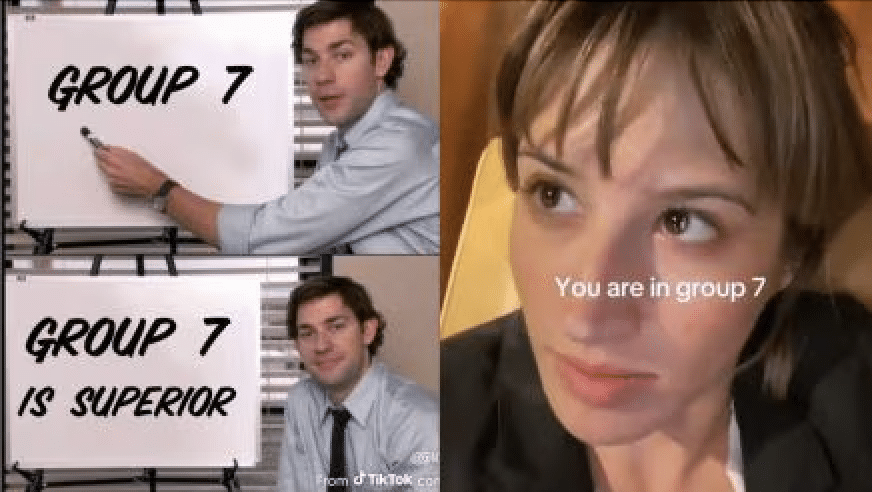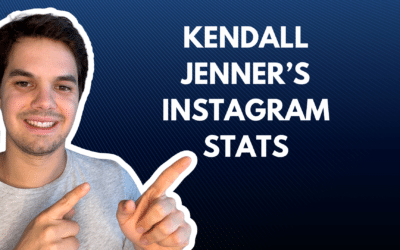What does Group 7 mean? Have you seen people on the TikTok app proudly calling themselves part of Group 7?
It’s the latest viral trend taking over social media… Turning ordinary users into self-declared members of an exclusive digital club.
Group 7 has become one of the biggest TikTok trends of 2025 because it perfectly blends psychology, algorithm curiosity, and Gen Alpha’s love for inside jokes.
Started by singer-songwriter Sophia James as a small experiment to test how TikTok’s algorithm distributes videos, the concept quickly exploded into a global meme where users proudly identify by the “group” they were placed in.
📑 What You’ll Learn
→ What Group 7 actually means and how it started
→ Who is Sophia James, the creator behind the trend
→ The rules and viral logic behind the trend
→ Which celebrities have joined Group 7
→ Answers to “What is a group of 7 called?” and “What does 6 7 mean?”
→ Why Gen Alpha slang and social identity are fueling the movement
→ How brands and creators are using it for engagement
What’s the Meaning of Group 7?
On October 17, 2025, Sophia James launched the experiment by posting seven consecutive TikToks, each using her new song “So Unfair” as background music.
Her aim? Test the TikTok algorithm.
She told reporters she believed “you just have to post no matter what it is – it’s really quantity over quality.”
@sophiajamesmusicEvery day I wake up♬ original sound – Sophia James
In her seventh video she declared:
“If you are watching this video, you are in Group 7.”
From there the hashtag #group7 exploded as users embraced membership, branded themselves “in Group 7,” and created a sense of exclusivity and fun.
Although Group 7 has no formal benefits or rules, it works because it offers:
Who is Sophia James? The Creator Behind Group 7
Sophia James (real name Sophia Wackerman) is a 26-year-old Australian-born singer-songwriter based in Los Angeles. She’s no stranger to the spotlight – James competed on American Idol Season 18 in 2020, reaching the Top 10 before her elimination.
After American Idol, she continued pursuing music independently, releasing her album “Clockwork” in 2024. Her music has even been featured on Grey’s Anatomy. But like many independent artists, she struggled to break through the algorithm and get her songs heard.
The Group 7 experiment was born out of frustration – and genius. As James told The New York Times: “I’ve really been trying all of these different strategies” to get her music heard.
She almost didn’t post the seventh video. When she woke up the next morning, the Group 7 video had “hit the algorithm” and the rest is internet history.
Since the trend went viral, James has:
How the Trend Works
Your “group” = the version you saw first
The videos were posted sequentially and numbered from 1 through 7.
👉 If the seventh video was the one that hit your For You Page first, you became “in Group 7”.
👉 You can’t choose your group—it’s determined by algorithmic chance.
👉 Once you were in, you could join the memes, comment “Group 7!” and join others who saw the same version.
Why Group 7 Went Viral
The idea of “am I in or out?” drives engagement and shares.
Big accounts and brands joined the joke, which amplified visibility. The simplicity of the concept makes it easy to replicate and remix. It ties into Gen Alpha’s slang and desire for digital belonging.
Celebrities and Brands in Group 7
The trend exploded when major celebrities declared their Group 7 membership:
| Celebrity/Brand | What They Posted |
|---|---|
| Madelyn Cline (Outer Banks) | “Good morning Group 7 baddies, how we doing” |
| Naomi Osaka | “If you’re not in Group 7, keep scrolling” |
| Barbara Corcoran (Shark Tank) | “How it feels waking up in Group 7” |
| Malala Yousafzai | Declared Group 7 membership |
| Kevin Jonas | Shouted out Group 7 during Jonas Brothers concert |
| Le Sserafim (K-pop) | Joined the trend |
| Blue Man Group | “Happy to be here” |
| Netflix | Created list of characters “definitely in Group 7” |
| Hyundai USA | “Group 7 is superior” |
| Empire State Building | Posted “how it feels to be in Group 7” |
The celebrity endorsements transformed what could have been a small experiment into a cultural moment.
What Does It Mean to Be in Group 7?
While there’s no official definition of what it means to be a Group 7 member, TikTok users have collectively decided on some traits.
According to viral comments, Group 7 members are:
As one popular comment put it: “I hereby declare Group 7 is the most elite group.”
Another user wrote: “Group 7 is the hot girl group. I don’t make the rules.”
The playful rivalry with other groups became part of the fun, with Group 7 members joking they have “immediate beef” with Groups 1-6.
Common Questions (and Quick Answers)
What is a group of 7 called?
What do you call a group of 7 people?
What does Group 7 mean on TikTok?
Group 7 elements are called?
What Does 6 7 Mean? (This is Different!)
The “6 7” (or “67”) trend is a separate Gen Alpha slang phenomenon that emerged from rapper Skrilla’s song “Doot Doot (6 7).” It has been banned in some classrooms.
✅ Group 7
• Created by Sophia James
• Started October 2025
• About TikTok algorithm experiment
• You’re “assigned” based on which video you see
• Has meaning (which video you saw)
🔶 6 7 (Sixty-Seven)
• Originated from Skrilla’s song
• Went viral in early 2025
• Nonsensical slang phrase
• Used as a general expression
• Has no fixed meaning
The “6 7” phrase is pronounced “six seven” (not “sixty-seven”) and comes with a hand gesture that looks like weighing two options. Dictionary.com named “67” its 2025 Word of the Year.
Some theorize “6 7″ references NBA player LaMelo Ball’s height (6’7”), while others link it to 67th Street in Philadelphia or Chicago. But mostly, it’s just brain rot slang that’s fun to say.
Real-Life Group 7 Meetups
Sophia James took the digital trend offline by organizing real-world meetups for Group 7 members:
On her website under the “Group 7” tab, James wrote: “This is the funniest thing I have ever seen and I think you should all meet in real life.”
Why It Matters for Social Media, Creators & Brands
For Creators
Algorithm experiments can spark whole trends, not just viral videos.
For Brands
Identity-based memes can be leveraged for engagement. Speed matters – trends die fast.
For Social Media Watchers
It reveals how easily digital identity can be manufactured via an app algorithm.
Who Created Group 7? Quick Facts
| Creator | Sophia James (@sophiajamesmusic) |
| Real Name | Sophia Wackerman |
| Age | 26 years old |
| Origin | Australian-born, based in Los Angeles |
| Background | American Idol Season 18 contestant (Top 10) |
| Song Featured | “So Unfair” |
| Date Started | October 17, 2025 |
| Peak Views | 52+ million on the Group 7 video |
Conclusion
Group 7 isn’t just another hashtag. It’s a case-study in how TikTok can turn a simple video experiment into a global meme that confers identity, belonging and status.
If you saw the seventh video first—welcome to the club.
Frequently Asked Questions
How do I know if I’m in Group 7?
Can I join Group 7 if I didn’t see the original video?
Is Group 7 still trending?
What happened to Groups 1-6?







